Professor David Miller received his PhD from the University of Kent at Canterbury in 1980. He was a Postdoctoral Research Assistant at Bristol University between 1980 and 1982 and a Postdoctoral Fellow at the University of Adelaide between 1982 and 1984. His interests are in the molecular genetics of corals - essentially investigating the molecular bases of coral-specific biological traits and the impacts of stress and disease on these. and collaboration between Miller’s group pioneered coral molecular genetics at James Cook University, and collaboration with OIST enabled the development of genomic resources for corals. Current research interests include coral-microbe interactions (focussing on the coral side of the interaction), reproduction and regeneration in corals, and the impacts of stress at the molecular level. Adequately addressing these topics requires the availability of whole genome sequences and other ‘omics resources for corals and their associated symbionts, the provision of which is a central focus of collaboration with the units at OIST led by Tim Ravasi and Nori Satoh.
Lab Members

David Miller
Visiting Professor/ Ravasi Unit

Tae Woo Ryu
Research Unit Group Leader
メール: Email
Twitter @ravasi_lab
I majored in Genomics and completed my PhD at the Korea Advanced Institute of Science and Technology (KAIST). After fell in love with coral reef and tropical fish, I have devoted myself to investigate how the coral reef creatures have evolved and respond to a rapid changing environments. As a Group Leader of Marine Climate Change Unit, I'm working on the front line of climate change biology to learn how tropical fish (especially fish of the Ryukyu Islands) behave and acclimate by ocean warming.

Roger Huerlimann
Postdoctoral Scholar
メール: Email
Twitter @RogerHuerlimann
Roger Huerlimann is a post-doctoral researcher in the Marine Climate Change Unit. Before joining OIST, Roger completed a PhD at James Cook University (JCU) in Australia, and spent the next five years there working as a post-doc in the Center for Sustainable Tropical Fisheries and Aquaculture and the Centre for Tropical Water and Aquatic Ecosystem Research (TropWATER). During this time, Roger worked on several commercial important aquaculture (barramundi, black tiger prawn, and silver lipped pearl oyster) and fisheries species (coral trouts), as well as other marine species (green sea turtles, hammerhead sharks and sawfish). Roger has extensive experience in carrying out and supervising molecular biology and genomics related research from the laboratory through to completing all required bioinformatic analyses. This includes sequencing, assembly and annotation of genomes and transcriptomes, metabarcoding (bacterial 16S, fungal ITS, eukaryotic 12S or COI), viral/bacterial metagenomics and eDNA research (field, lab and analysis protocols).

Chengze Li
Postdoctoral Scholar
Twitter @ravasi_lab
I completed my doctoral studies at the University of Hokkaido in 2019, where my research focused on the phylogenetic and molecular biology of nitrogen transporters in red seaweeds. In 2022, I began working as a lab technician in Marine Climate Change Unit, primarily assisting research projects using molecular biology and genomics techniques. As of January 2025, I have transitioned to a postdoctoral position, where my work focuses on understanding the combined effects of ocean warming, suspended sediments and cross-generational thermal plasticity in coral reef fish. Outside of work, I enjoy spending time with my family, playing ping-pong, snowboarding, and exploring the natural beauty of Okinawa.
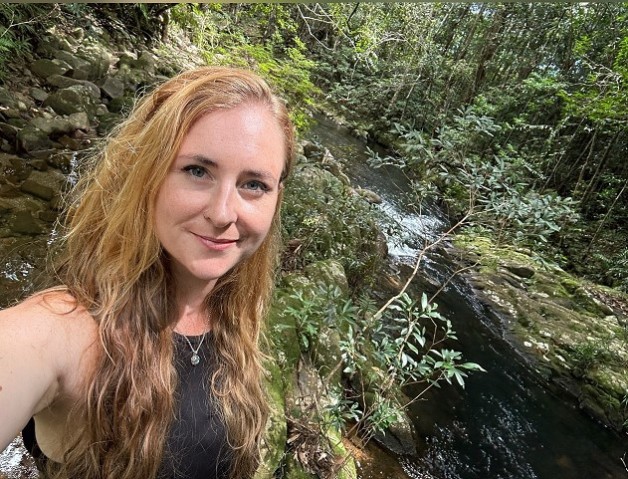
Shannon Kjeldsen
Postdoctoral Scholar
メール: Email
Twitter @ravasi_lab
Shannon is passionate about wildlife conservation and uses genomic tools to investigate a range of ecological questions. She completed her undergraduate degree in Animal and Veterinary Bioscience at the University of Sydney, before moving to Townsville, Australia, to pursue a PhD investigating the population genetics of koalas across Australia.
During this time, she worked on a variety of genomics projects, including the phylogeny and population structure of native Australian animals such as koalas, dingoes, barramundi, and blue-ringed octopus. She also contributed to the development of genomic resources to improve selective breeding and management of aquaculture species in Australia. After completing her PhD, Shannon became involved in citizen science initiatives monitoring shifts in marine species distributions, and she is now using environmental DNA, and other non-invasive monitoring methods to monitor disease outbreaks, and enhance aquaculture production in Okinawa, Japan.

Nicolas Dierckxsens
Interdisciplinary Postdoctoral Fellow
メール: Email
Twitter @ravasi_lab
I am a computational biologist from Belgium, who is specialized in the development of new tools for genetic research. During my PhD in Brussels, I developed a new organelle assembler, called NOVOPlasty, which became one of the most popular assembly tools. After my PhD, I worked for 4 years as a postdoctoral researcher in university hospitals (Guangzhou and Leuven) on the detection of disease-causing variants. My passion for nature and wildlife brought me to Okinawa to study the marine life around this beautiful island. I will be an interdisciplinary postdoc between the Marine Climate Change unit of Prof. Ravasi and the Genomics and Regulatory Systems unit of Prof. Luscombe. In my free time, I love to do sports and hopefully I will be able to learn to dive during my stay on Okinawa.

Emanuela Borgnino
JSPS Fellow
メール: Email
Twitter @ravasi_lab
I am an environmental anthropologist from Italy with a major in Japanese Language and Culture and a PhD in Cultural and Social Anthropology. My work sits at the intersection of anthropology, environmental and conservation sciences, and Pacific Studies. For the last three years I have been conducting extensive research on the topic of ecological responsibility in the Hawaiian archipelago where I was a Visiting scholar at UH Manoa, Center for Pacific Island Studies. I am currently a JSPS Fellow in the Marine Climate Change Unit, where, with my cross-regional comparative focus on history, culture and ecology on Okinawa and Hawai‘i, I hope to improve our understanding of the bio-cultural dynamics between sociocultural and natural domains bearing on resilience and sustainability at fine-grained local, supra-local, and regional scales. Today my main interests are the climate change and Indigenous Science, and the role of Indigenous ontologies in the age of the Anthropocene.

Michael Izumiyama
JSPS Fellow
Twitter @ravasi_lab
I graduated from San Francisco State University with my MSc in Marine Biology, where I looked at the reproductive strategy of surfperches, a unique family of fishes that give live birth. Fishes have always had a special place in my heart, and I am particularly interested in evolution and speciation in fishes. My hobbies are diving, swimming, and fishing, but I also enjoy time outside of the water and love a good laugh!

Billy Moore
JSPS Fellow
メール: Email
Twitter @ravasi_lab
I completed an undergraduate degree at Swansea University, before graduating from the University of Essex with an MSc in Tropical Marine Biology. During my studies I completed internships at the University of Western Australia and The Observatoire Oceanologique de Villefranche, where I investigated the effects of ocean acidification on coral and coralline algae from extreme environments. I am now a first year PhD student in the Ravasi Unit where I will investigate the impacts of environmental change on coral reef fish. I love all sports, the ocean and exploring new exciting places, making Okinawa the perfect place for me!
Haruka Matsumoto
Visiting Researcher
メール: Email
I grew up in Ehime in Japan where the stars are beautiful at night. I dreamed of going to space one day, and later, I decided to send the satellite there instead of me. I got interested in remote sensing through my project about a cube satellite designing competition during my undergrad at Kobe University. This brought me to work on a large data set of the atmosphere and ocean to investigate climate change, and cloud formation modelling over the ocean in PhD project at Technical University of Denmark. Now I study how remote sensing can be applied to monitoring and understanding the impact of environmental changes on marine ecosystems in Okinawa in Japan and Sisimiut in Greenland. Besides the research project, I embarked on a local community project in Nepal to install solar energy in remote areas, and a scientific diving project in Indonesia to promote marine conservation and sustainable fishing with local fishermen. I love scuba diving underwater, maybe because it feels like I am an astronaut in space.

Jeffrey Jolly
Research Unit and Field Work Technician
メール: Email
Twitter @ravasi_lab
I’m happy to share my background in molecular biology, marine fieldwork, and animal husbandry as a member of the Marine Climate Change Unit. I originally joined OIST in 2016 as the manager of the cephalopod operations in Daniel Rokhsar’s Molecular Genetics Unit where I worked to pioneer the emerging laboratory model cephalopod, Euprymna berryi, and helped describe several unknown Okinawan species of cephalopods. I’m originally from Florida where I earned my BSc in pre-medicine with a focus in molecular biology at the University of West Florida. After graduating I joined Hui-Min Chung’s cell signaling laboratory as a research assistant while simultaneously becoming peripherally involved in marine science research. I’m interested in being on the leading edge of climate change research and learning more about life in the sea. I usually spend my free time doing Brazilian Jiu-Jitsu, or in the water surfing, freediving, or SCUBA diving.

Gelyn Bourguignon
Fish Husbandry Technician
メール: Email
Twitter @ravasi_lab
Being at OIST allows me to enjoy the beauty of nature and the view of the ocean everyday. I love living the Okinawan chill and stress-free life. Joining the Marine Climate Change Unit, I am excited to learn new things and acquire new skills. I am responsible for making the marine fishes happy and giving these lovely creatures an enjoyable life in the world we created for them. In my free time, aside from exploring the island with my family, I like to study Nihongo, sing in karaoke and in the process, damage the eardrums of the unfortunate audience. Yoroshiku onegaishimasu.

Alexandru Mihai
Research Unit Bioinformatics Technician
メール: Email
Twitter @ravasi_lab
I grew up in the United States, but I’m a Romanian citizen. I hold a Bachelor’s degree in pure mathematics from Jacobs University in Bremen, Germany, where I participated in research at Fraunhofer MEVIS. There, I implemented two and three-dimensional models in C++ to produce an efficient and accurate portrait of blood flow dynamics. I completed my Ph.D. in the Mechanics and Materials Unit at OIST. My thesis focused on modeling soap-film-mediated self-assembly systems. Currently, I work as a data science technician in the Marine Climate Change Unit. In my free time, I enjoy exploring all Okinawa has to offer (particularly looking out for new cafes).

Lucas Furtado
Fish Husbandry Technician
メール: Email
Twitter @ravasi_lab
I hold a degree in Marine Biology and Biotechnology from the Escola Superior de Turismo e Tecnologia do Mar. Throughout my career, I have worked with various marine species, including some emblematic ones, gaining a broad understanding of ocean biodiversity.
With a strong background in aquariology and aquaculture, I have focused on optimizing sustainable fish farming systems and improving the welfare of aquatic animals. My approach combines hands-on experience with scientific methods to enhance marine.
Currently, I am based at the Okinawa Institute of Science and Technology (OIST), where I am dedicated to developing sustainable aquaculture practices and contributing to the conservation of marine ecosystems.

Ayşe Haruka Oshima Açıkbaş
Graduate Student
メール: Email
Twitter @ac_haruka
I completed my undergraduate studies in Biological Sciences at Carnegie Mellon University in Qatar, where I investigated putative cis-regulatory modules for skeletonization in sea urchins and the markers of cancer-associated fibroblasts. Now as a PhD candidate doing marine biology for the first time, I would like to study the tropicalization phenomenon in Japan and its impact on the biodiversity using eDNA methods. I absolutely love the sea here and enjoy exploring, playing the piano and talking to my parakeet Fıstık.
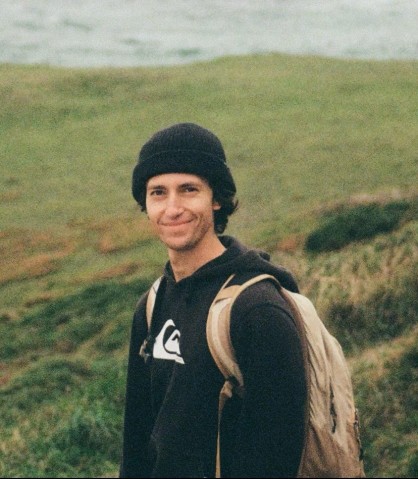
Callum Hudson
Graduate Student
メール: Email
Twitter @CallumHudson_
Born and raised in Cornwall, UK, I have long-loved all things marine, be it surfing, diving, or tide-pooling. I completed an undergraduate degree in Biological Sciences at the University of Oxford, before graduating with an MRes in Marine Biology from the University of Plymouth. My thesis utilized a natural, volcanic CO2 seep in Japan to study the impacts of ocean acidification and typhoons on the stability of marine communities. With the help of the Ravasi Unit my PhD investigates how sea urchins respond to global change, using natural analogues for future ocean conditions to understand the implications their shifting functional role as algal grazers has on the wider ecosystem.

Johanna Johansson
Graduate Student
メール: Email
Twitter @JohannaJohansson
I have always been interested in science and the oceans and when I was 14 I decided that I wanted to be a marine biologist. I moved to Hawaii from Sweden to do my undergraduate in marine biology at Hawaii Pacific University. That is when I found my interest in coral reefs, which added to my interests in genetics and ecology of marine life. Coming from Sweden I had never seen a coral reef before and fell in love the first time I went snorkelling. After graduating I worked a bit and saved money to be able to continue studying and got accepted to the masters of science in marine biology program at James Cook University in Townsville, Australia. During my masters studies I did my masters research project on the genetics of range shifting species. This is what lead me to combine my interests in genetics and ecology with a current issue and in the end it is what lead me to find the Marine Climate Change unit at OIST. I am very excited for the opportunity to learn more and work with everyone.
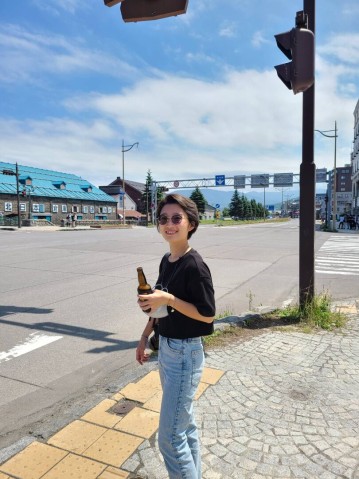
Yijin Lee
Graduate Student
メール: Email
Twitter @ravasi_lab
Initially majoring in Japanese language and literature at Pusan National University, I later shifted my academic focus to biology, resulting in a double major in Biological Science. I got obsessed with subtropical/tropical ecosystems like mangrove forests and coral reefs, but since Korea lacked them, I decided to head to Japan. I completed my MSc at the University of Tokyo, where I studied mudskippers (Periophthalmus modestus) in Tokyo Bay. As my fascination with gobies grew, I made the choice to move to Okinawa. Now, in my first year of a Ph.D. in the Ravasi unit, with the goal of exploring coral reef fishes further. Beyond academics, I'm into sports without balls, like ultimate frisbee, bouldering and snorkeling - looking for more gobies!

Yuno Kaneshi
Research Unit Administrator
Twitter @ravasi_lab
I was born and grew up in this beautiful island. I joined OIST after graduating the University of Ryukyus in 2012, my main role is to provide administrative supports to unit members to make their research conducted smoothly. I am very grateful to work with this amazing team led by Prof. Ravasi. Outside work, I love dancing and traveling. I am also interested in languages.
Alumni

Erina Kawai
Research Unit Scientific Diver
メール: Email
Twitter @aroeriiiiina
I graduated from the University of Ryukyu with an MSc in Marine Biology. My main jobs at the Marine Climate Change Unit are, 1) assit all unit's members with field work and fish collection in Japan and around the world and 2) to make coworkers smile. I love the sea, scuba diving, dogs, sweets and Okinawa.

Yoko Shintani
Research Unit Administrator
メール: Email
Twitter @yoko_the_ocean
I joined OIST in April 2018 coming from working in scientific publishing at Nature Japan in Tokyo. My role at the Marine Climate Change Unit is to provide administrative support to Prof. Timothy Ravasi and the other unit members, helping them to smoothly reach their research goals. I'm truly delighted to work close to marine scientists while embracing the stanning marine environment surrounding Okinawa and the Ryukyu archipelago. My passions are the ocean and Wushu.

Shannon McMahon
Postdoctoral Scholar
メール: Email
Twitter @ShannonJMcMahon
Hailing from the Blue Mountains, west of Sydney, I grew up fascinated with the Ocean and each trip to the beach was spent exploring rock pools, digging through the intertidal zones, and surfing. However, it wasn’t until after completing a bachelors in communication, and travelling abroad, that I realized I wanted to help understand and protect our oceans. This led me to James Cook University. During undergrad I became drawn to research on the future challenge our oceans may face. This resulted in me undertaking Honours by research (2016) with Prof. Philip Munday & Dr Jennifer Donelson, where I investigated the effects of CO2 and feed levels on the growth and behaviour of clownfish. Following this I went on to complete my PhD (2021) focusing on the effects of marine heat waves on the growth and physiology of reef mesopredators under the supervision of Dr. Jennifer Donelson & Prof. Philip Munday. Now having arrived at OIST (2022) in the Marine Climate Change Unit, I am excited to continue researching the effects of climate change on reef fish.

Kaisar Dauyey
Visiting Research Student
メール: Email
Twitter @ravasi_lab
My passion for ocean and research on climate change comes from experiences around the world. I've spend several months working on computational neuroscience in Lausanne, Switzerland as well as studying photoacoustics in Cambridge, UK and stem cell biology in Tsukuba, Japan during my undergraduate years at Nazarbayev University (NU) in Kazakhstan. I've then jumped into my graduate medical degree at NU School of Medicine. As part of my research training I've completed several internships in University of Queensland working on computational biology of autoimmune diseases in elderly and children. I've then enrolled in a PhD course at the SOKENDAI University, Department of Genetics in 2019 studying ancient human genomes as well single-cell RNA-sequencing in zebrafish. My current work is focused on understanding of genomic changes in tropical fish in response to ocean warming.

Jamila Rodrigues
Visiting Researcher
メール: Email
Twitter @Jamilajaguar
I am an Anthropologist focused on the well-being and crisis management and a visiting scholar at the Marine Climate Change Unit. In 2022, I was awarded a JSPS fellowship hosted by the International Research Centre for Japanese Studies, Kyoto. In this unit, I am collaborating with marine scientists on a survey study among marine science and social scientists working in interdisciplinary research in the context of Japan. I am also developing a pilot project that investigates Okinawan fishery communities' ideas and experiences regarding climate change, its socio-cultural impact, and its impact on the well-being of communities and coastal areas. Travelled to more than fifty countries and did extensive ethnographic fieldwork in Europe, Africa, South America, and East Asia on gender, indigenous knowledge, coping with crisis and well-being.
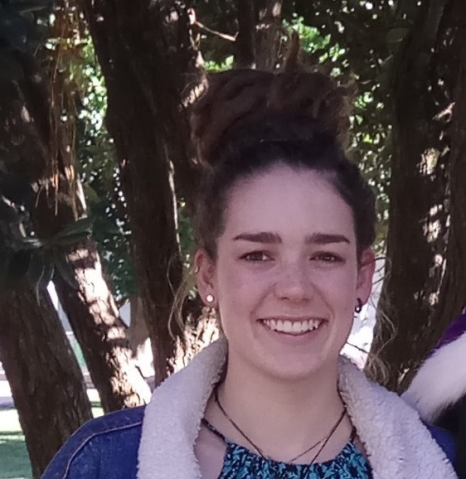
Jodi Thomas
Visiting Research Student
メール: Email
jodi.thomas@my.jcu.edu.au
Twitter @jodithea2
I am a PhD candidate at James Cook University, Australia, supervised by Prof. Philip Munday and Dr. Sue-Ann Watson, and collaborating with the Marine Climate Change Unit at OIST. My thesis is investigating the neurobiological mechanisms through which elevated CO2 affects marine invertebrate behaviours, focusing on squid. I completed my Bachelor of Science (Honours) in Neuroscience at the University of Otago, New Zealand. My honours project, and following work as a research assistant, focused on the neuroendocrine regulatory and molecular mechanisms underlying female-to-male sex change in sequentially hermaphroditic fish. I am interested in the intersection of neuroscience and zoology, and the role of the brain in behaviour and phenotypic plasticity. Outside of research, I enjoy craft projects including pottery, sewing and candle making.
I also enjoy getting into the outdoors and camping.

Naomi Asato
Research Intern
メール: Email
Twitter @ravasi_lab
I graduated from the University of Minnesota with a degree in global health and pre-medicine, focusing on environmental impacts on health. During my undergraduate studies, I had an internship providing academic lessons to high school students in multiple medicine and healthcare conferences at Harvard Medical School, UCLA, and American University. Though my studies are focused on global health with prior lab experience as a research assistant at the Institute of Child Development, I have always been passionate about the ocean and marine life. Thus, I am very excited for the opportunity to learn and work in marine science research. Being from Okinawa, I am so happy to return to the island after completing my studies in the U.S. and learning more about the impact climate change has on marine life. In my free time, I enjoy surfing, snorkeling, running, reading, and spending time with my family here in Okinawa!
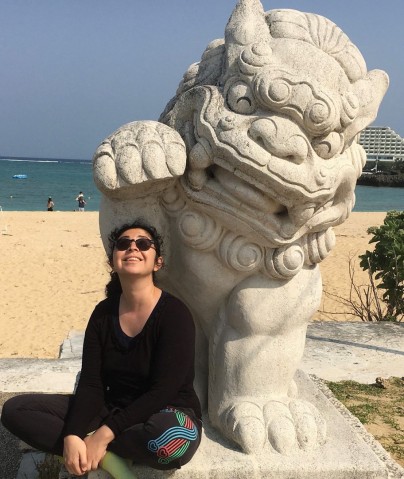
Radmila Neiman
Fish Husbandry Technician
メール: Email
Twitter @ravasi_lab
I graduated from Ben Gurion University in Israel, with a Bachelor Degree in Medical Laboratory Science, where I did bioinformatics research, and worked at the local hospital. I then joined a material engineering lab at Penn State University. Now, I am tending to the lovely animals in the marine research labs here at OIST! Having lived a few years on this beautiful island, it has become a character in my family’s life, with its own personality and quirks. Every day, I continue my conversation with it, by exploring its hidden places.




